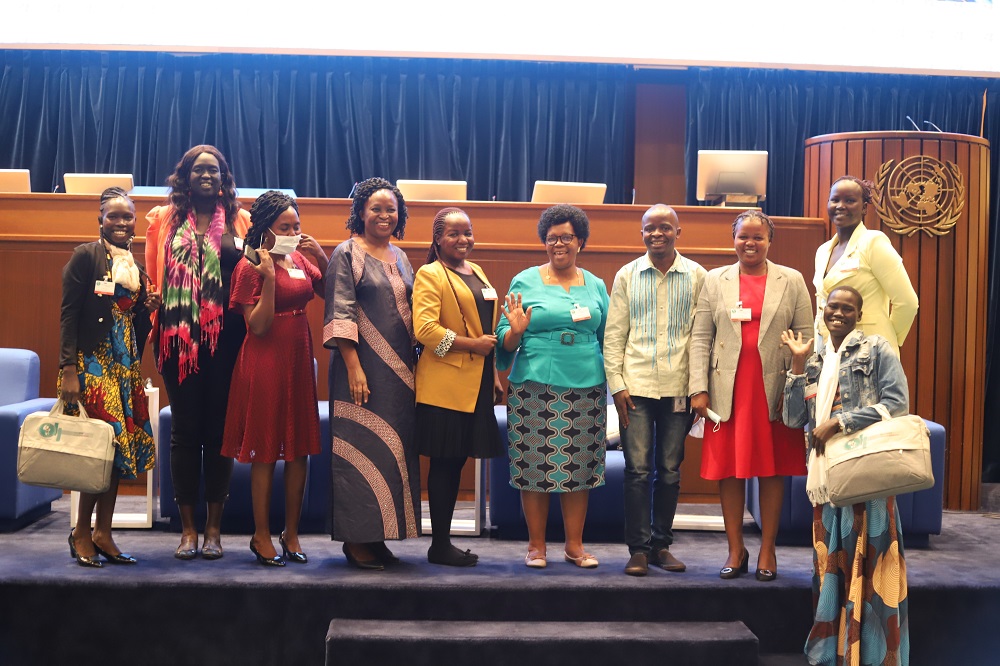From 1st to 4th February 2022, the Gender Is My Agenda Campaign (GIMAC Network) convened its 38thVirtual Pre-summit CSOs Consultative meeting under the theme: Advancing Women’s Access to Economic Resources to Build Our Continent’s Resilience in Nutrition in Addis Ababa.
The 38th GIMAC was co-moderated by Women’s International Peace Centre(The Peace Centre) and the Institute for Social Transformation, with support from the AU Commission for Social Affairs, the Office of the Special Envoy on Women, Peace and Security and the AU Women, Youth, Gender and Development Directorate (AU YWGDD) sought to achieve the following objectives through the Pre-Summit Consultation;
- Consolidate CSOs’ review of the AU legal and strategic framework on food security and nutrition taking a gender-transformative approach, focusing on achievements and critical gaps towards implementation;
- Propose rights-based, inclusive, effective, and efficient strategies that enhance and utilize the agency and role of women and girls in realizing the vision for ending hunger and addressing hunger;
- Strengthen intergenerationally and gender transformative approach towards the transformation of societal norms and institutional structures that guarantee a conducive environment for women’s human and economic rights;
- Celebrate, document, and share best practices on innovations and positive approaches on gender and nutrition that advance gender equality; and
- Provide space for African CSO’s strategic engagement with AU, RECs, UN Agencies, International Organizations, and other stakeholders.
Held in a hybrid and in-person format, the meeting brought together over 200 delegates from more than 20 countries, representing the AU, United Nations officials, Diplomatic missions, development partners, civil society organizations (CSOs), the private sector and other interested groups. Key partners that participated in meetings included the United Nations Entity for Gender Equality and the Empowerment of Women (UN Women), the United Nations Economic Commission for Africa (UNECA), Plan International, MSD for Mothers, Oxfam, the International Planned Parenthood Federation (IPPF), and Action Aid.
The Peace Centre facilitated partners of 3 national partners from Burundi, South Sudan and the Democratic Republic of Congo (DRC) in the pre-summit meeting to inform discussions around the 2022 African Union (AU) Assembly of Heads of Ste and Government.
Partners made presentations and recommendations that were received by the AU Women Gender and Youth Directorate (AUWGYD) Director, AU Special Envoy on Women, Peace and Security, the AU Envoy on Youth and East African Community representative for presentation to technical committees and member states representations.
These focused on the need for the AU, Regional Economic Communities (RECs) and member States to mainstream gender equality in food security responses in fragile states and to strengthen gender inclusiveness in its preventive diplomacy, conflict prevention, peace-making, peacebuilding and post-conflict reconstruction.
Given that 38GIMAC was held against the backdrop of the pandemic seismic shifts triggered by the Covid-19 pandemic, especially disruptions on the continent’s livelihoods and economies, participants noted how the corresponding mitigation measures such as partial lockdowns, border closures and movement restrictions, have been at the expense of reducing malnutrition. The unprecedented Covid-19 prevention protocols not only resulted in constricted business activity, but also disrupted food supply chains, and curtailed small-scale agriculture, which is the main source of food and nutrition security in Africa. Not to talk of the full, and partial closure of schools, which resulted in a loss of access to school-feeding programmes, which has negatively affected the lives of children. Additionally, safety net programmes, including community nutrition programmes for women and children that were temporarily halted, exposed populations to food insecurity.
The recommendations from the 38 GIMAC Pre Summit meeting also emphasized the need to address structural and systemic drivers of poverty, gender inequality and socio-economic vulnerability, discrimination and violence against women and girls, as well as challenges of corruption, poor governance and limited political participation by women and youth.



